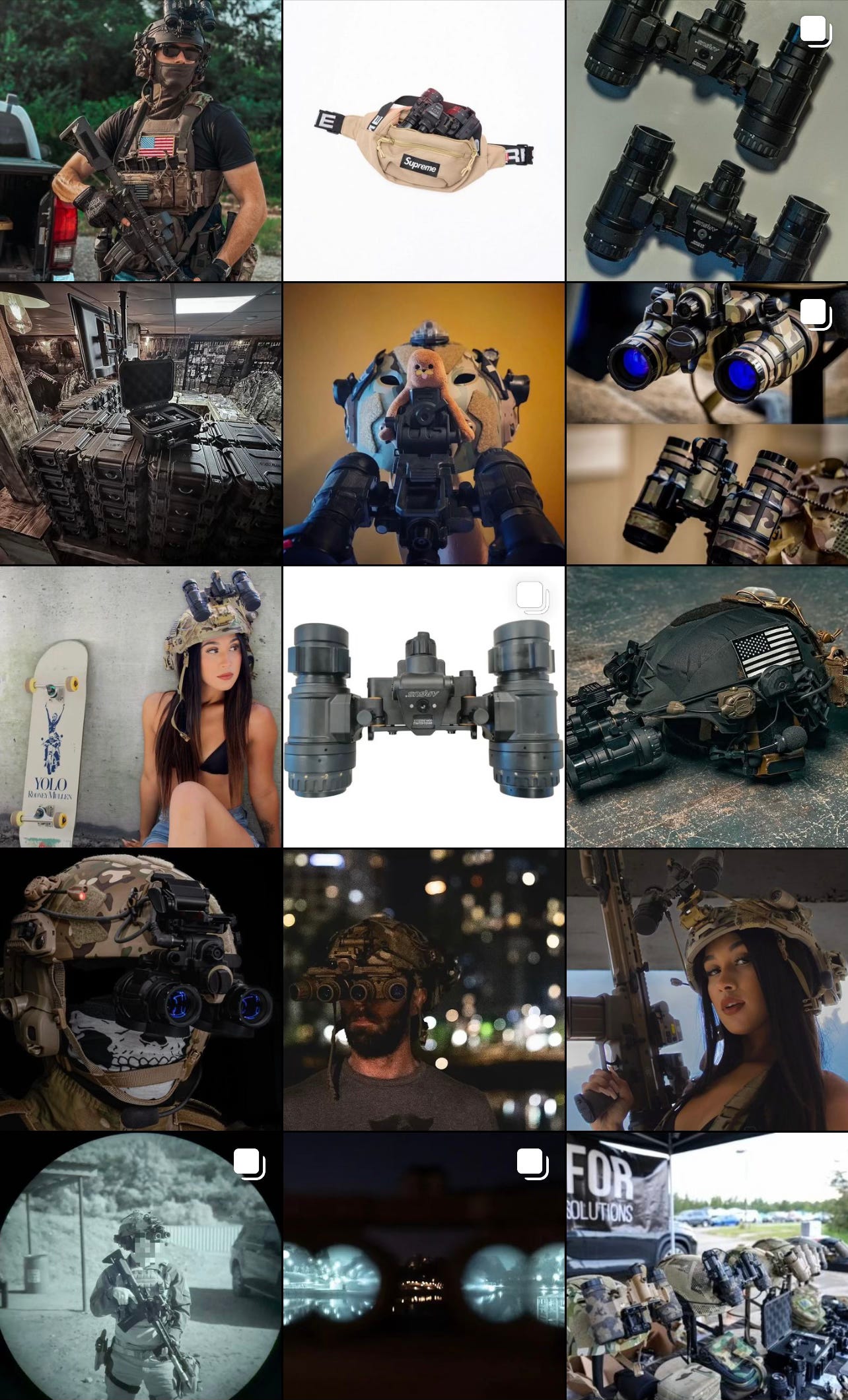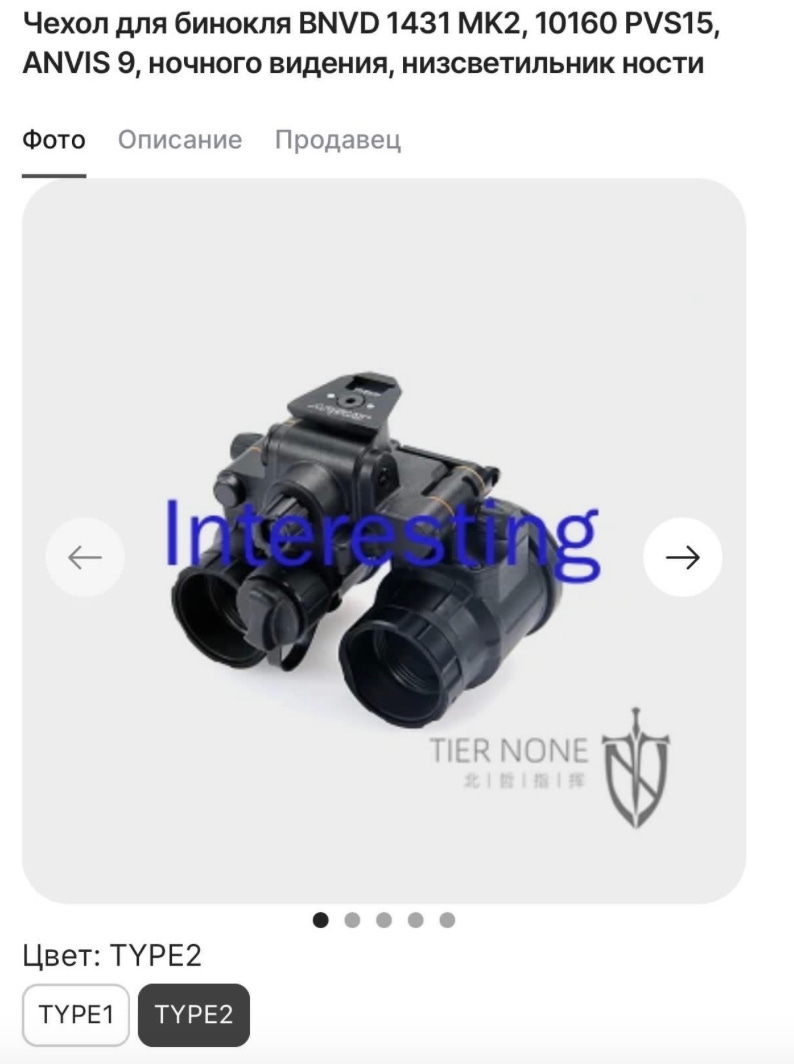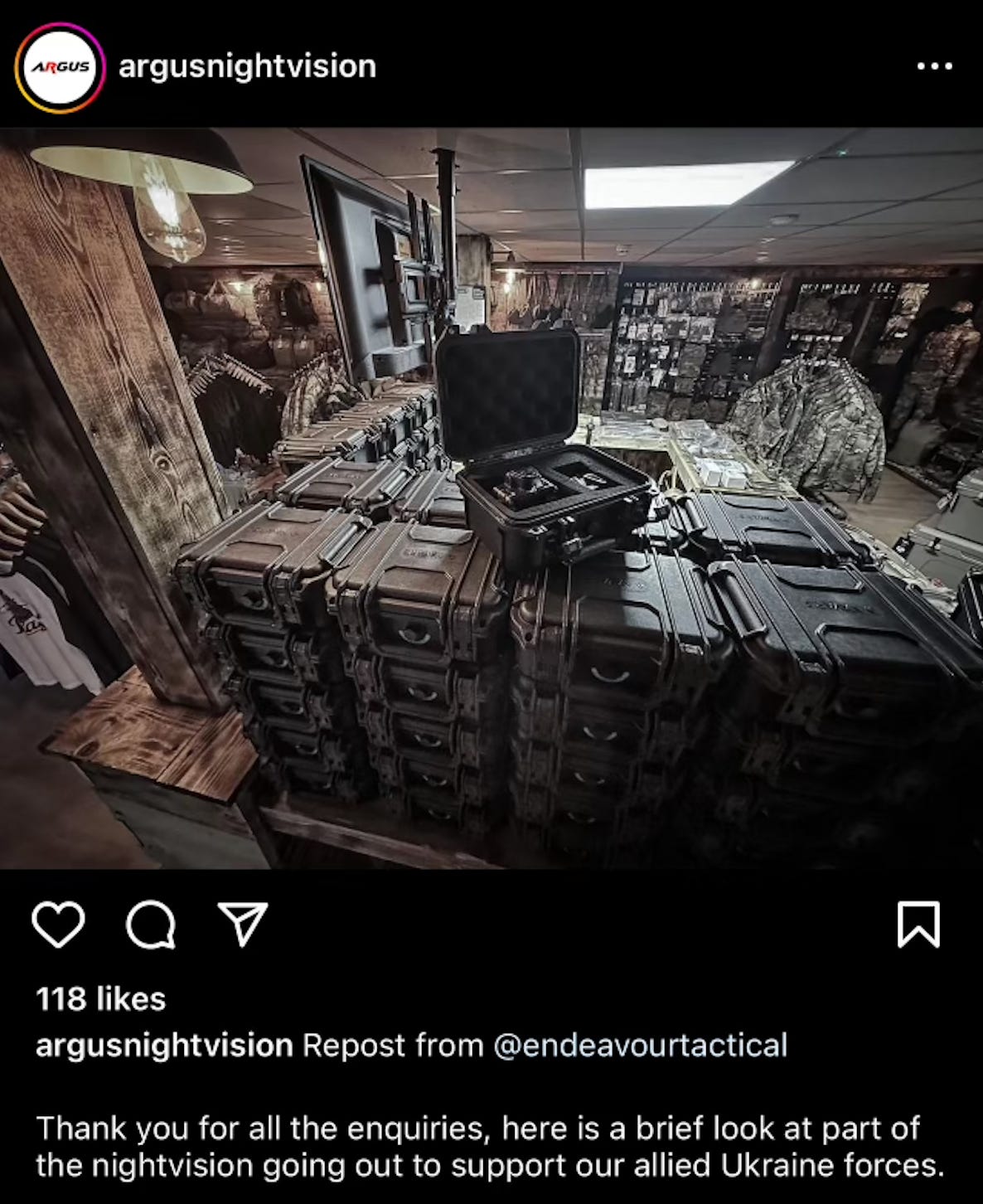Unwitting Americans Support the Chinese Military Industrial Complex
Stop buying enemy gear & start buying American (or anywhere aside from PRC, DPRK, RUS, IRN, VEN)
In our article on Chinese infiltration of the American tactical community we singled out a specific firm, Argus Night Vision, a Chinese night vision housing and image intensifier tube manufacturer based in Tianjin. In the article we stated, “Argus improves its designs by selling their products to the U.S. and then receiving feedback from American citizens.” This turned out to just be the tip of the iceberg.
What is Argus Night Vision?
The description below was pulled directly from Argus’ Alibaba profile.
“Tianjin Argus Technology Co., Ltd. (天津阿尔戈斯科技发展有限公司) was registered in August 2018. It was founded by researchers of optical-electrical systems and experts in night vision equipment applications. More than 50% of our staff are involved in research and development. In 2020, after being certified by the Tianjin Municipal Science and Technology Bureau, we obtained the qualification of National High-tech Enterprise. In 2021, we scaled up our business and established a sales branch in Beijing, the capital city of PRC.
Since our establishment, the company has been committed to the research and development of image intensifying technology and the manufacture of night vision equipment. We have developed and produced a series of night vision goggles, night vision tactical components, and low-light application terminal products for domestic military units, public security sectors, emergency response departments, as well as international markets. They are widely used in fields and scenarios such as special operations, anti-terrorism, stability maintenance, emergency rescue, live-fire training, crime investigation, anti-smuggling, overseas peacekeeping, coastal defense, border patrol, urban security, outdoor exploration, and so on.”
There are a few things that stick out in this description. The first is that Argus qualifies as a National High-tech Enterprise (高新技术企业). This may seem like marketing jargon, but to qualify for this status a company must be “a knowledge-intensive and technology-intensive economic entity within the scope of "High-tech fields supported by the state," promulgated by the state.” Once these qualifications are satisfied and a company receives this certification, it then enjoys preferential tax policies, special government financial incentives, staff settlement bonuses, and other policy benefits that may include things like rent holidays for office space, wage support, etc. According to the US-China Business Council, the High and New Technology Enterprise (HNTE) program offers qualified companies a 15 percent corporate tax rate (versus the standard 25 percent tax rate) and employees also pay reduced income taxes.
In addition, HNTE’s employees are eligible to settle in the city of their workplace with just one year of work experience under the talent introduction and settlement policies. This is critical in attracting and retaining skilled professionals in a society where internal movement is controlled through the hukou system, much like the former Soviet Union’s internal passport system. All of these benefits constitute state subsidies and are inherently anti-competitive.

The US-China business council and other organizations have already pointed out these policies hurt the ability of US firms to compete in China domestically, but at this stage in the US-China relationship, this isn’t the major issue. Most American-owned companies understand that IP shared with China is stolen by China, and operational longevity in the country is limited. The broader problem with these policies is that they allow Chinese firms to develop products at artificially low prices and then export them abroad into non-subsidized markets. This allows Chinese firms to compete unfairly in the U.S. and other Western countries. This undercuts Western domestic manufacturers by capturing market share with artificially low prices and muscling out local companies which receive no subsidies. This is the definition of anti-competitive behavior, typically termed dumping.
In a confidential interview with a large U.S. night vision and thermal optic manufacturer, a representative confirmed this phenomenon, stating that low-cost Chinese products entering the market have hindered their ability to innovate. This representative confirmed that it is well known in the U.S. manufacturing community that almost all Chinese night vision and thermal imager manufacturers are funded by the Chinese government.
The second part of the Argus description that sticks out is, “We have developed and produced a series of night vision goggles, night vision tactical components, and low-light application terminal products for domestic military units, public security sectors.” A domestic Chinese firm producing domestic tech for the military is nothing unique.

As can be seen above, Argus’ Chinese social media presence displays Argus equipment in the hands of PAP and Chinese police.
What is unique about Argus is that it markets itself externally (outside of China) as an innovative night vision manufacturer that provides night vision solutions at an affordable price point. Argus’ U.S. marketing efforts are in line with other American kit manufacturers who mix product images in with well known “hype” brands like Supreme, photos of scantily clad women, and high speed videos of Westerners using their gear. In doing this, Argus intentionally obfuscates their relationships to the Chinese armed forces (PLA/PAP) and police so it can appeal to American hobbyists and professionals who are looking for an 80% solution where cost is a significant factor.
As we can see, Argus’ domestic and international marketing is intentionally different. Obviously, none of Argus’ Chinese social media photos could be found on their U.S. social media account. Argus is almost certainly aware of the potential backlash should they be found directly affiliated with the Chinese armed services and police. According to the Argus Alibaba profile, approximately 50% of their business outside of Chinese government contracts comes from North America.
Design Improvement
According to confidential sources in the tactical industry, Argus has contacted Americans (with obvious military affiliations) offering travel to China in return for staff training on night vision equipment and product feedback. Aside from the fact that such activity is a federal crime, it shows how brazen Chinese firms are in their attempts to improve product design and facilitate U.S.-China technology transfer. While we could not corroborate this information with Argus, the company profile does state they intend to facilitate training on their products. This being said, Vermilion cannot verify with complete certainty that Argus’ product development is aided by Americans.
We can, however, confirm that Canadian companies are facilitating Argus’s product development. HCC Tactical, a U.S. firm that holds a GSA contract (# 47QSWA22D006Q) and sells Argus products stated,
“Our sister company in Canada (Opfor Night Solutions) has worked directly with Argus to improve and evaluate the BNVD-1431 series of products. Their feedback and recommendations led directly to many of the improvements made to this housing for the MK II. Their weatherproofing service is no longer necessary as all changes have been made at the factory, and the OPFPR Night Solutions upgrade screw kit has been supplied to the factory so all units come with them as standard.”
In addition to this, Kinetic Consulting posted a video confirming that OpFor Night Solutions provided product feedback to Argus which was then used to improve Argus designs.
This leads to two questions. 1.) Are companies with GSA contracts or their subsidiaries allowed to sell equipment used by hostile militaries? 2.) Are American firms providing feedback to manufacturers, and if so, how prevalent is this practice?
According to our confidential interview with an industry representative mentioned above, the answer to question two is an emphatic “Yes.” Regarding thermals specifically, the representative stated, “individuals and companies involved in distributing Chinese thermal devices in the U.S. help guide their development and production efforts.” This can almost certainly be extended to night vision.
Sales
Unfortunately, Argus BNVDs are some of the most popular night vision systems sold in the U.S., Canada, and Australia. As a result, distributors are incentivized to promote and improve Argus products so they can increase sales. This creates a situation where American citizens are unknowingly in support of modernizing the People’s Liberation Army. Major distributors of Argus products are listed below and for many of these companies, Argus BNVDs are their most popular products.
Canada
The OpFor page does not mention that Argus products originate in China, and labels the BNVD-1431 series as a “Canadian Custom Build”. OpFor passively mentions Argus, stating, “We are the only company in Canada working directly with Argus to improve and evaluate the BNVD-1431 series of products. Our feedback and recommendations led directly to many of the improvements made to this housing.” OpFor also sells Argus branded counterfeit Wilcox night vision mounts.
U.S.
The USNV page does not mention that Argus products originate in China. It does mention that Argus BNVDs are ITAR restricted, which could make product feedback a federal crime.
The HCC Tactical page does not mention that Argus products originate in China. It does mention that Argus BNVDs are ITAR restricted, which could make product feedback a federal crime.
The Custom Night Vision page does not mention that Argus products originate in China.
The Steele Industries page does not mention that Argus products originate in China.
In addition to this, Argus also exports their products to Russia.
This is once again in contrast to their marketing in the U.S., Canada, Australia, and the U.K., where Argus highlights their products being sent to Ukraine.
Solutions
The most sweeping and effective solution to these problems would be a complete ban on Chinese manufactured military gear. Long term, this would allow U.S. companies and companies from non-hostile countries (literally anywhere aside from China, Russia, Venezuela, North Korea, Cuba, Iran, Syria, Yemen) to become more competitive and improve their products.
An intermediate solution short of a complete ban would be requiring distributors to disclose country of origin and military association on sales pages. Country of origin would not be country of modification. U.S. companies often state that Chinese manufactured products modified by Canadian firms constitute Canadian products, which is inaccurate. This would mean that individuals who purchase these products would be aware of where they are coming from and what the implications of their purchase are.
The fact that Americans are funding PLA modernization should be of significant concern to U.S. and allied service members, and all those who oppose the Chinese Communist Party. One of the mantras that all infantrymen are taught during training is “we own the night.” If Americans continue to support companies like Argus, American and Allied infantrymen will be downgraded to simply “renting the night.”
EDIT (20240125 17:19:40 UTC):
On Chinese social media Argus states they are able to avoid ITAR restrictions.
“阿尔戈斯科技现已开始全球微光夜视用户供应超二代微光夜视像增强器,提供价格友好且不受ITAR管控的军品级微光像增强器。”
Argus Technology has now begun to supply ultra-second-generation low-light night vision image intensifiers to global low-light night vision users, providing price-friendly and Military-grade low-light image intensifier not subject to ITAR restrictions.





